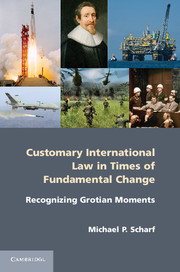Book contents
- Frontmatter
- Contents
- Author’s Biography
- Acknowledgments
- 1 Introduction
- 2 Historical Context
- 3 Theoretical Underpinnings
- 4 Nuremberg
- 5 The Truman Proclamation on the Continental Shelf
- 6 Outer Space Law
- 7 The Yugoslavia Tribunal’s Tadic Decision
- 8 The 1999 NATO Intervention
- 9 The Response to 9/11
- 10 Conclusion
- Index
- References
4 - Nuremberg
Published online by Cambridge University Press: 05 June 2013
- Frontmatter
- Contents
- Author’s Biography
- Acknowledgments
- 1 Introduction
- 2 Historical Context
- 3 Theoretical Underpinnings
- 4 Nuremberg
- 5 The Truman Proclamation on the Continental Shelf
- 6 Outer Space Law
- 7 The Yugoslavia Tribunal’s Tadic Decision
- 8 The 1999 NATO Intervention
- 9 The Response to 9/11
- 10 Conclusion
- Index
- References
Summary
This chapter examines whether the paradigm- shifting nature of the Nuremberg precedent, and the universal and unqualified endorsement of the Nuremberg Principles by the UN General Assembly in 1946, constituted a Grotian Moment, resulting in accelerated formation of customary international law related to modes of responsibility and universal jurisdiction.
Was Nuremberg a Grotian Moment?
Nearly everyone has a passing familiarity with the events that prompted the formation of the Nuremberg Tribunal in 1945. Between 1933 and 1940, the Nazi regime established concentration camps where Jews, Communists, and opponents of the regime were incarcerated without trial; it progressively prohibited Jews from engaging in employment and participating in various areas of public life, stripped them of citizenship, and made marriage or sexual intimacy between Jews and German citizens a criminal offense; it forcibly annexed Austria and Czechoslovakia; it invaded and occupied Poland, Denmark, Norway, Luxembourg, the Netherlands, Belgium, and France; and then it set in motion “the final solution to the Jewish problem” by establishing death camps such as Auschwitz and Treblinka, where six million Jews were exterminated.
- Type
- Chapter
- Information
- Customary International Law in Times of Fundamental ChangeRecognizing Grotian Moments, pp. 63 - 106Publisher: Cambridge University PressPrint publication year: 2013



